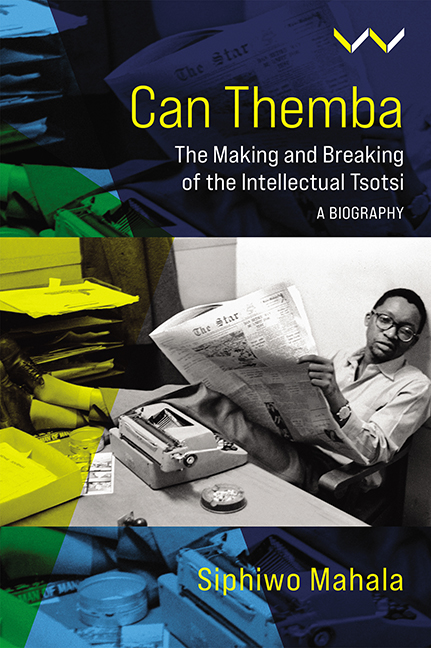Book contents
- Frontmatter
- Dedication
- Epigraph
- Contents
- List of Illustrations
- Acknowledgements
- Introduction
- PART I Death and Birth of a Scribe
- PART II ‘Live Fast and Die Young’
- PART III The ‘Intellectual Tsotsi’
- PART IV Dances with Texts: Writing and Storytelling
- PART V A Writer’s Immortality
- Postscript: The Three Burials of Can Themba
- Notes
- Bibliography
- Index
12 - The People’s Intellectual
Published online by Cambridge University Press: 26 May 2022
- Frontmatter
- Dedication
- Epigraph
- Contents
- List of Illustrations
- Acknowledgements
- Introduction
- PART I Death and Birth of a Scribe
- PART II ‘Live Fast and Die Young’
- PART III The ‘Intellectual Tsotsi’
- PART IV Dances with Texts: Writing and Storytelling
- PART V A Writer’s Immortality
- Postscript: The Three Burials of Can Themba
- Notes
- Bibliography
- Index
Summary
Although some people may describe him as an intellectual, I don’t dismiss that – of course he was – but he wasn't a type of intellectual who was somewhere above people. He was a very approachable down-to-earth person that you could meet and interact with.You know, we had many intellectuals, they are sort of a little above ordinary people like us, so it was not easy, but not with Can. It was easy to interact with him because … although he was described as an intellectual, he was also a people's man.
Ahmed Kathrada — Interview (2015)One of the leading theorists on African intellectuals, Toyin Falola, posits that ‘thinkers may be variously labelled as pragmatist, traditionalist, assimilationist, or Afrocentrist, although the line is not always clear-cut. Some are radical, others are conservative.’ Can Themba defies these parameters, as his intellectual architecture cuts across the conventional categories. The closest we can come is to label him a pragmatist, simply because he adapted to different situations and contexts; but this is not always an accurate assessment, as testimonies by people close to him, such as Jean Hart, reveal that he was never afraid of taking unconventional or extreme positions at times.
It might be more useful to consider Themba in the light of Antonio Gramsci's definition of an organic intellectual, and examine the various factors he listed as key. The fundamental elements of Gramsci's definition include position in society; intellectual training; preoccupation with abstract ideas; and fulfilling a public role.
If we take a brief look at Gramsci's components and apply them to Themba, we find that the element of position in society is probably the most challenging. Themba was by law a second-class citizen inthe land of his birth because of the apartheid government's aversion to the colour of his skin. Yet, his natural charisma, erudition and role as a mouthpiece of ideas as a journalist for Drum gave him a position that enabled him to wield considerable influence.
Themba's editor at Drum, Sylvester Stein, strongly believed that Themba was a natural leader: ‘Can was a natural chief by force of personality, and intellectually a giant. I put him down as a coming man of Africa.
- Type
- Chapter
- Information
- Can ThembaThe Making and Breaking of the Intellectual Tsotsi, a Biography, pp. 147 - 156Publisher: Wits University PressPrint publication year: 2022



